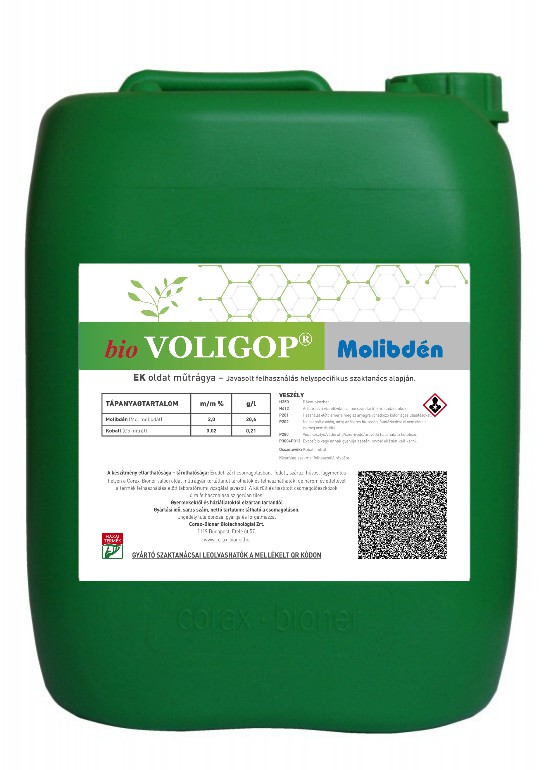
Application field: Bio Foliar Fertilizer
Active Substance: Macro-, mezo-, and micro-elements according to the EC Regulation No 2003/2003.
Sodium and chlorine free premium EC fertiliser
The presence of molybdenum is essential for the utilisation of nitrogen and it also supports the uptake of phosphorus. It is extremely important for the Papillonaceae, sunflower, rape, sugar beet, maize, Brassicaceae, onion, tomato, root vegetables, cereals. In the absence of molybdenum, plants are unable to utilise the nitrogen accumulated in the leaves during the protein synthesis. In this case symptoms are similar to nitrogen deficiency, as nitrogen is accumulated in the plant without being utilised. As a result of the molybdenum deficiency the young leaves turn yellow, the old leaves fall off, rosette disease symptoms complex is detected (the leaf itself is not growing, only the leafstalk is growing and the development of the fruit is also delayed). Molybdenum deficiency symptoms are similar to the symptoms of nitrogen deficiency, but in this case the “burnt leaves” are the result of the accumulated but not utilised nitrogen. The impact of molybdenum deficiency increases in droughty periods. Upon molybdenum deficiency the young leaves of potato are light green and later on they turn brown, the edge of the leaves starts to roll up and dry off; less flowers are produced and they turn brown and die off. In the case of cauliflower, rose distortion is frequent, if the plant forms a head; the head becomes loose and brown-coloured. The old leaves of carrot turn brown and dry off, the plants remain small. On the leaves of cucumber and tomato suffering from molybdenum deficiency the inter-vein areas become lighter coloured, the leaf edges curl up, finally the leaves die off. On the edges of the celery leaves burnt areas can be detected.
The presence of molybdenum is essential for the nitrogen symbiotic fixation of pulses. In this case the deficiency of molybdenum produces similar symptoms to the symptoms of nitrogen deficiency, as the root nodule bacteria have a high molybdenum requirement. Vegetables in case of extensive application of nitrogen fertiliser require more molybdenum. The product is partially suitable for the supplementation of cobalt micro-elements.
Its translocation within the plant is very low; its availability decreases in soils with acidic pH; the sulphate ion hampers its absorption, while phosphate ion supports its absorption.
Copyright © 2017 Corax Bioner Co. | All rights reserved | Data protection